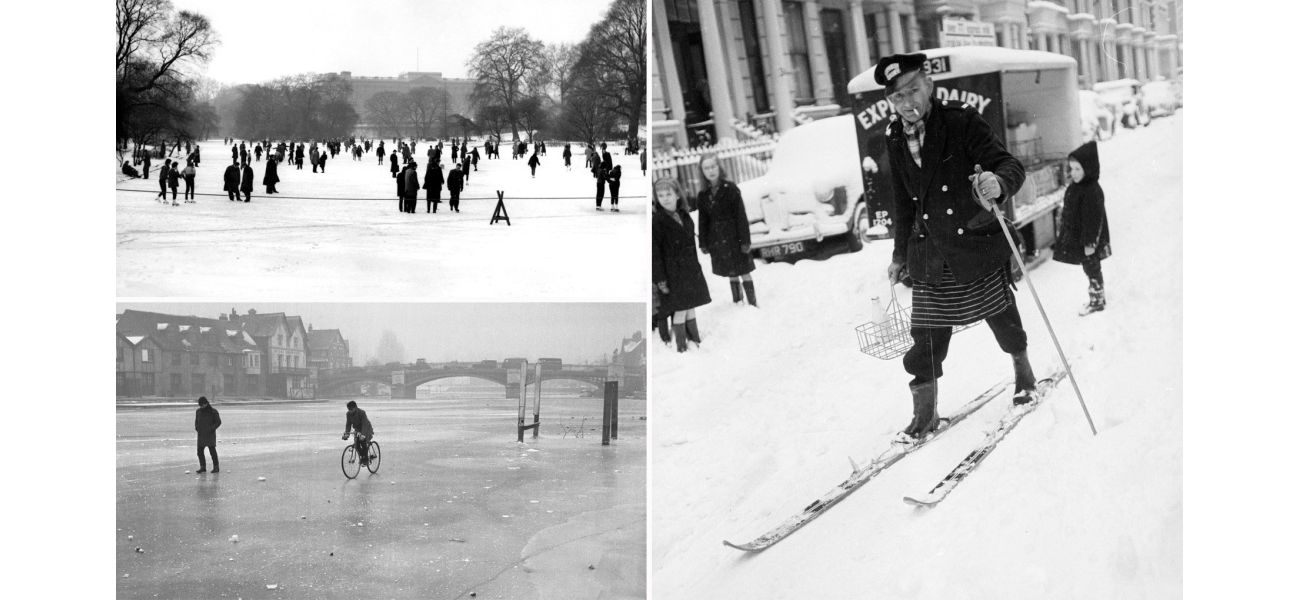In the Big Freeze of 1963, oceans froze and temperatures reached -22°C.
January 3rd 2025.

The chill of winter has descended upon Britain with full force, as the Thames River has completely frozen over. The forecast predicts a cold snap with plenty of snow in the upcoming days, prompting a three-day snow warning and urging people to stay indoors and prepare for the worst. But this predicted weather is nothing compared to the Big Freeze of 1963, a winter that will forever be etched in the memories of those who experienced it.
During this brutal winter, temperatures dropped to record lows of -22°C, causing lakes, rivers, and even the sea to freeze over. The snowfall began in mid-December and continued relentlessly for four months, with an anticyclone over Scandinavia bringing even more cold air from Russia. As the Scandinavian high collapsed over Christmas, a new one formed near Iceland, bringing icy northerly winds and dumping even more snow on the UK.
The blizzard that swept across southern England and Wales on December 29-30 brought drifts of over 20ft, blocking roads and railways and leaving villages stranded. The extreme cold meant that the snow cover lasted for more than two months in some areas, causing chaos and disruption. Even Big Ben's famous bongs to mark the new year were delayed by 10 minutes due to the large amount of snow on the clock's hands.
The freezing temperatures also caused the sea to freeze over in Herne Bay, Kent and Leigh-on-Sea, Essex, and icebergs formed in the River Mersey, obstructing vessels. However, in central London, the Thames did not freeze over thanks to the hot wastewater being pumped from Battersea and Bankside power stations. Despite this, the upper reaches of the Thames did freeze over, creating a rare opportunity for skaters and sliders to take to the ice.
Throughout the Big Freeze, daily life was severely disrupted. Sport events were cancelled or rescheduled multiple times, with the Football League season being extended by four weeks to make time for postponed games. National Hunt horse racing was also affected, with 94 meetings cancelled during the freeze. Schools were forced to close, homes faced power cuts, and livestock perished from the extreme weather conditions.
Finally, in early March, the temperatures began to rise and the remaining snow gradually disappeared. Thankfully, there were no widespread floods caused by the rapid thawing. As the Big Freeze came to an end, the true extent of the damage and disruption caused by this winter was revealed. But for those who lived through it, the memories of the frozen Thames, blizzards, and record-breaking cold temperatures will never be forgotten.
During this brutal winter, temperatures dropped to record lows of -22°C, causing lakes, rivers, and even the sea to freeze over. The snowfall began in mid-December and continued relentlessly for four months, with an anticyclone over Scandinavia bringing even more cold air from Russia. As the Scandinavian high collapsed over Christmas, a new one formed near Iceland, bringing icy northerly winds and dumping even more snow on the UK.
The blizzard that swept across southern England and Wales on December 29-30 brought drifts of over 20ft, blocking roads and railways and leaving villages stranded. The extreme cold meant that the snow cover lasted for more than two months in some areas, causing chaos and disruption. Even Big Ben's famous bongs to mark the new year were delayed by 10 minutes due to the large amount of snow on the clock's hands.
The freezing temperatures also caused the sea to freeze over in Herne Bay, Kent and Leigh-on-Sea, Essex, and icebergs formed in the River Mersey, obstructing vessels. However, in central London, the Thames did not freeze over thanks to the hot wastewater being pumped from Battersea and Bankside power stations. Despite this, the upper reaches of the Thames did freeze over, creating a rare opportunity for skaters and sliders to take to the ice.
Throughout the Big Freeze, daily life was severely disrupted. Sport events were cancelled or rescheduled multiple times, with the Football League season being extended by four weeks to make time for postponed games. National Hunt horse racing was also affected, with 94 meetings cancelled during the freeze. Schools were forced to close, homes faced power cuts, and livestock perished from the extreme weather conditions.
Finally, in early March, the temperatures began to rise and the remaining snow gradually disappeared. Thankfully, there were no widespread floods caused by the rapid thawing. As the Big Freeze came to an end, the true extent of the damage and disruption caused by this winter was revealed. But for those who lived through it, the memories of the frozen Thames, blizzards, and record-breaking cold temperatures will never be forgotten.
[This article has been trending online recently and has been generated with AI. Your feed is customized.]
[Generative AI is experimental.]
0
0
Submit Comment





